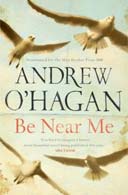
Andrew O'Hagan's Be Near Me is finely written, and the fineness of the writing is partly what the novel is about. It is a first-person narrative, and its narrator, David Anderton, a Roman Catholic priest, values his own eloquence. He has been to a public school and Oxford; he has studied in Rome; he is a connoisseur of music and art and wine, whose pleasures he likes to turn into descriptive celebration. He has read poetry and Proust. The novel's style is its central character's style. From the beginning, David cannot resist a sentence with some elegant, suggestive turn to it. "My mother once took an hour out of her romances to cast some light on the surface of things," he begins, doing justice to the dispassionate, ironical manner of their usual conversations. She, like him, is drawn to the patterns that sentences can satisfyingly make.
David's favourite rhetorical trick is zeugma (from the Greek for "yoking"), where one word is applied to two others in different senses. Mr McCallum, the headmaster of the local Catholic school, is presented "wearing a blue pinstripe suit and a thin smile of alcoholic amity". "Conor was tipsy with beer and ambition," David recalls, as he describes a distant evening as a student with his long-dead lover. It is a neat phrase for the mixture of hedonism and self-importance that once came naturally. In contrast, his working-class parishioners are ruled by "a desire for state benefits and babies", as if the inclinations to live from handouts and to procreate were identical. It is a judgment made with characteristic verbal ease. He watches Mark and Lisa, the teenagers he foolishly goes out driving with one night, larking around in a garage shop, "each one a selfish fool made charming by the power of the moment and the yellow strip-lights".
There are other patterns, too, and an appetite in the narrator for aphoristic couplings. When he was young, his mother wrote historical novels into the small hours. "My mother's nights were empty of sleep but filled with beautiful craft." He remembers his former Oxford tutor "forever shaking his watch at his ear, waiting for time to move on and jokes to improve". He tells how an unusual childhood "made me a natural Catholic but a less than natural person". Insight is offered through a perceived pattern of words, a clever prose couplet.
His contrary housekeeper, Mrs Poole, tells him, with a hint of mockery, that she is pleased to be working for "a person who knows how to put a sentence together". David's pleasure in sentences is a barrier between him and the world. There is something wrong with his articulacy, as Mark's father notices. "'You have a nice way with words, Father,' he said. 'Are you English?'" In the grim Ayrshire seaside town that is his new parish, his voice is all wrong. "It's right posh, the way you go on."
David consciously flourishes the incongruity of his phrase-making, nicely finding words for the behaviour of those who do not have the words themselves. Explaining how the pupils in his religious instruction class at the local school customise their uniforms, he tells us, "The small energies of disdain could be observed in all this". He has to muster all his poetic syntax to explain just what Mark's youthful allure might have been, yet calls him "small-minded" as he does so.
Only recollecting the famous victories of Celtic Football Club rouses Mark to some kind of expressiveness, yet David finds descriptions for him that seem borrowed from his cherished memories of Renaissance art. "We noticed when he opened his eyes and shaded them from the sun to look at us, because they brought something of the sun down with them, to include us, to let us share in his own warm rays of assurance." We are supposed to notice that there is something peculiar in fitting this to the cheerful, foul-mouthed youth whom we can actually hear speaking in the novel.
In the trial near the end of the book, where he stands accused of sexually assaulting Mark, his fastidious attention to language merely antagonises the sheriff who presides. He has pleaded not guilty, he says, because "I hated the wording of the charge". His own explanation is wilfully distant from colloquialism. "My crime ... was a crime of mis-recognition. For a short time, I allowed myself to be in thrall to an unsuitable person." "Your remarks are obtuse," the sheriff tells him, and we know that the jury will find him guilty.
O'Hagan has made the enjoyment of style, for the reader but also surely for himself, an intriguing limitation upon his character. Eloquence is what David carries with him out of his past, what protects him and makes him solitary. It is there in place of the human needs over which he thinks he has triumphed.
· John Mullan is professor of English at University College London. Join him and Andrew O'Hagan for a discussion of Be Near Me at the Newsroom, 60 Farringdon Road, London EC1 on Monday July 9. Doors open at 6.30pm. To reserve a ticket (£8 including a glass of wine) call 020 7886 9281 or email book.club@theguardian.com

